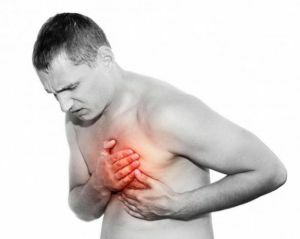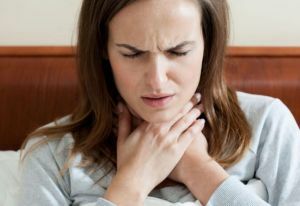 Neurosis is the collective name of reversible psychogenic disorders, which are characterized by a protracted course. In medicine, there is still no definite indication of this disease, therefore neurosis is regarded as a functional disorder of higher nervous activity.
Neurosis is the collective name of reversible psychogenic disorders, which are characterized by a protracted course. In medicine, there is still no definite indication of this disease, therefore neurosis is regarded as a functional disorder of higher nervous activity.
To answer the question, what exactly can disturb at a neurosis, it is difficult enough. Because the pain manifests itself in different ways.
With neurosis, very often a person is suffering from pain in the heart, head, abdomen, back, muscles and other organs. This brings unpleasant sensations and discomfort not only in the physical plane, but also psychological.
The patient often has to run from one doctor to another, take tests and conduct tests until he finally gets to the therapist.
There are different causes of neuroses. These are chronic stressful situations, psychological trauma, fatigue, aggression and conflicts in the family, severe illnesses, nervous system exhaustion, and psychoemotional stresses.
How can a nervous breakdown occur physically?
Transient physiological discomfort symptoms, which develop on a nervous basis, can be observed in many people. However, if the pain with neuroses last a long time and is pronounced, then in this case the disease in the chronic stage should be addressed to a specialist.
For a person in a nervous state, the following are characteristic:
- frequent tearfulness;

- heightened sensitivity to stressful situations( when a person reacts too aggressively to a small stress or falls into despair);
- sensitivity;
- rapid fatigue, characterized by a decrease in concentration of attention, memory, cognitive abilities;
- sleep disturbance;
- autonomic dysfunction;
- intolerance of bright light, loud sounds, temperature changes;
- decreased sexual desire.
Very often with a neurosis, there is a headache, which has a different nature of occurrence. The same applies to the symptoms. According to statistics, more than 50% of patients present this clinical manifestation. This disease of the nervous system worsens the quality of life, deprives a person of the opportunity to live fully and enjoy every day.
 There are three types of neurosis: hysteria, neurasthenia and obsessive-compulsive disorder. At each of them a person can feel heaviness and squeezing in the head, pulsing in the temples. It is very important to contact a specialist in time. In no case should one do therapy alone and drown out the symptoms of anesthetics.
There are three types of neurosis: hysteria, neurasthenia and obsessive-compulsive disorder. At each of them a person can feel heaviness and squeezing in the head, pulsing in the temples. It is very important to contact a specialist in time. In no case should one do therapy alone and drown out the symptoms of anesthetics.
Pain in the heart with a neurosis is also a normal condition, in parallel the patient can feel shortness of breath, heart palpitations, dizziness, sweating, fear, weakness, anxiety, apathy and mental fatigue.
The signs of cardioneurosis include obsessive thoughts. The patient begins panicking  fearing that a heart attack can happen to him, which will be fatal for him. In the heart there may be aching pain, tightness, tingling and heaviness.
fearing that a heart attack can happen to him, which will be fatal for him. In the heart there may be aching pain, tightness, tingling and heaviness.
It should be remembered that in the heart region can give back the stomach pain, back problems or intercostal neuralgia. It is very difficult to identify the exact localization of the painful place, so it will be necessary to undergo a series of diagnostic tests.
Stressful situations, increased mental stress, exhaustion of the autonomic nervous system lead to pain in the stomach, which is also characteristic of neurosis.
In parallel, the following symptoms may be felt: 
- flatulence;
- pain;
- spasms;
- belching;
- nausea;
- heartburn;
- rumbling.
The neurotic nature of the disease makes itself felt differently than gastroenterological ailments. For example, a person can feel the emptiness in the stomach a few minutes after eating. Or after a couple of sips can feel a full stomach. The patient begins to use drugs that are everywhere advertised, engaged in self-medication. And the problem lies in another. It is important to find the cause of the illness in time to start treatment correctly and in a timely manner.
With neurosis, soreness and discomfort in the joints and muscles can also be observed. When the nerve root is impaired,  tissue conductivity decreases significantly, and impulses to the organs and muscles, respectively, are poorly received.
tissue conductivity decreases significantly, and impulses to the organs and muscles, respectively, are poorly received.
Neuroticity in this case is manifested by tension in the region of the waist and neck, nervous tic, tremor, pain of a different kind. These unpleasant feelings are accompanied by weakness, poor appetite, apathy, irritability, increased fatigue.
For neuroses are characterized by discomfort and pain in different parts of the body, which deprive a person of spiritual balance. There are common signs for all manifestations. This is a state of anxiety, fear, irritation, pain. It's very difficult to live this way. Therefore, the patient has to go to different specialists to find the main cause of their ailments. And only after different types of diagnosis, the patient can get to the therapist.
An experienced specialist will be able to diagnose correctly and prescribe a treatment. Therefore, do not waste precious time on self-medication, postponing a visit to a medical center. Therapy should be comprehensive. This is the only way to quickly return to the normal rhythm of life.
As a preventive measure, you should reconsider your lifestyle. It is very useful to do physical exercises and walk in the fresh air. It is important to monitor the diet, limit the consumption of harmful foods, eat more fruits, vegetables and greens.
Relaxing the nerves will help the chocolate tile and relaxation techniques. But coffee can not be crammed, because caffeine will only aggravate the irritating factor. To improve the psycho-emotional state it is useful to listen to good music, it is desirable to avoid stressful situations and learn to react to everything calmly.



